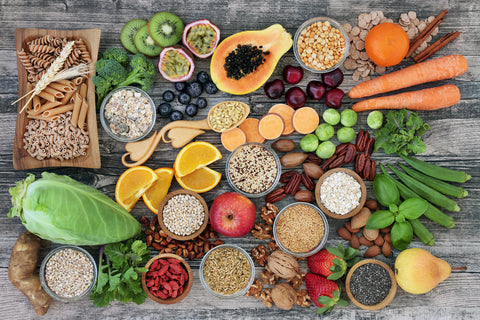No Products in the Cart
How are the Gut and Brain Connected?
By Danielle Omar, RDN
Whole body health is very much like a puzzle. How all the pieces fit together is often misunderstood. Gut health and brain health sound like two very separate pieces, but these two organs are physically and biochemically connected in a number of fascinating ways!
How Are The Gut & Brain Connected?
If you’ve ever felt your stomach flip flop when you’re about to do something scary (like a presentation or a toast at your best friend’s wedding) or if you get butterflies when the love of your life walks into a room, you’ve experienced the relationship between your brain and your gut.
Your gut and brain communicate regularly through a network called the gut-brain axis. Your brain contains millions of cells called neurons, and they communicate with each other via the vagus nerves. The vagus nerves start in the brain and run down through the neck and abdomen, all the way to your large intestine. This superhighway of neurons controls many bodily functions, from breathing to digestion to heart rate. Your vagus nerve connects the brain in your head to the “second brain” in your gut.
Your gut and brain aren’t just connected by neurons – they’re connected by neurotransmitters, too. Neurotransmitters like serotonin, norepinephrine, epinephrine, and dopamine help regulate the gut-brain axis.
While many of these neurotransmitters are produced in the brain, the gut plays a major role as well. In fact, a large proportion of serotonin is produced by microbes in the gut. Gut microbiota also produce a neurotransmitter called gamma-aminobutyric acid (GABA), which helps balance stress and anxiety. Research in this area is looking at how specific strains of probiotics are able to increase the production of GABA and help to reduce anxiety. Other neurotransmitters have the ability to affect things like gut motility, nutrient absorption, immune system function, and microbiome diversity.
Gut bacteria can alter the chemicals in your brain, too. When gut microbes digest dietary fiber, they produce short-chain fatty acids. These short-chain fatty acids can help your body heal from digestive disorders, reduce inflammation, regulate blood sugar, reduce your risk of developing heart disease, and even help you lose weight.
What To Eat For A Healthy Gut & Brain
What you eat can have a positive impact on brain health and help the beneficial bacteria in your gut thrive. Below are the most influential foods when it comes to optimizing brain and gut health.
HEALTHY FATS
Omega-3 fatty acids are powerfully linked to cognitive health. As the primary component of cellular membranes, fats play a critical role in cell structure and fluidity. Fats are super important in the brain because they enable electrical signal transmission among neurons. This is one reason why our brain is so rich in fat, and why docosahexaenoic acid (DHA) is the most abundant omega-3 in cell membranes in the brain.
Fatty fish like salmon, tuna, and mackerel are all great sources of omega-3s. You can also get omega-3 from plant sources of alpha-linolenic acids, or ALA. These types of plant fats get converted to EPA and DHA in the body. That conversion process isn’t super efficient, so you may need to up your omega-3 intake if you’re relying solely on plant-based foods. Learn more here about plant-based sources of omega-3 fatty acids.
FERMENTED FOODS
Probiotics are living bacteria that are found naturally in food or added to food products and supplements. These microorganisms are considered “probiotics” when they’ve been demonstrated to confer health benefits and improve bowel function.
Fermented foods naturally contain probiotics or have probiotics added to them. They contain live cultures that rely on the sugars and fibers found in the food in order to grow. Some of my favorite fermented foods include sourdough bread, Greek yogurt, tempeh, and raw sauerkraut. I also really like kombucha and other fermented drinks.
HIGH FIBER FOODS
Prebiotics come from the fiber in carbohydrates. They are beneficial to gut health because they provide fuel for the healthy bacteria to thrive. In this way, fiber plays an important role in keeping your digestive tract healthy. In addition to feeding bacteria, fiber helps regulate bowel movements, slow down the speed at which food is digested, and helps improve blood cholesterol levels.
High fiber fruit like berries, vegetables, leafy greens, whole grains, beans/legumes, nuts, and seeds are all great sources of fiber. Be sure to eat these plant foods in their natural form because processing can remove the fiber and other important nutrients.

TARGETED SUPPLEMENTS
There are specific nutrients our body needs to keep the gut and brain healthy: B vitamins, iron, vitamin D and calcium all play a major role in optimal brain and gut health.
Calcium plays an essential role in the neurological functioning of the brain. As a signaling molecule, calcium enables learning, cognition, and the retention of memories. It also facilitates communication among nerve cells and transports molecules to the many branches of the nerve cell.
B vitamins like folic acid and B12 are needed for proper brain development and gut function, as well as the functioning of blood cells and nerves. Folic acid helps prevent iron deficiency and can help manage liver disease, ulcerative colitis, and anemia. The body uses folic acid to create new cells and prevent rapid changes at a cellular level that might lead to disease.
Vitamin D is also super important for maintaining gut and brain health. Every cell in your body has a receptor site for vitamin D. Recent studies have recognized vitamin D as a necessary “neuro-steroid” and have confirmed an association between a vitamin D deficiency and cognitive impairment and dementia.
Absorption of many nutrients can decrease with age and older adults may need more B12, calcium and vitamin D. Supplementing with Fit Formula Wellness vitamin D and calcium powders can add an additional layer of support as we age.
Adding fatty fish and fermented foods to your daily intake, along with foods rich in calcium, B vitamins and vitamin D are an important first step in creating an eating style that supports optimal brain and gut health.





